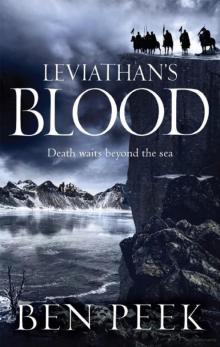The Eternal Kingdom (The Children Trilogy Book 3) Read online
Page 2
‘I have not read it.’
‘But she told you about it?’
‘In parts. It sounded as if she had bartered for something.’
‘What would be worth this much? This will bankrupt her. It will leave her with nothing.’
‘Your mother—’ The witch cut her sentence short and sighed. ‘Mireea is lost. The Leerans have destroyed it. Our home exists only in memory now.’
Eilona’s memories were not such that she would miss Mireea. She began to fold the letter along its creases. ‘But you still work for my mother?’
‘I made my life on battlefields.’ Olcea paused and, in that moment, Eilona saw the fatigue set deep into the other woman’s dark skin, the grief that was at its core. ‘I left before the first Leeran soldier arrived in Mireea. I am not proud of that, but I did. I had planned to go to Gogair to start a new life. I told myself that a slaver’s town always has use for a woman like me. That is what fear will do to you, child. Fear will lead you to betray who you are and it will cost you the image that you hold of yourself. My fear guided me all the way to Yeflam before I stopped myself. It was there that I realized I had spent too much of my time working with orphans to work for a slaver. I was still living in Yeflam when your mother found me. She did not spare me her judgement when she asked me to deliver this letter. I agreed because she was right in that, not because I thought she was right in what she wrote you.’
The conversation ended and Eilona escorted Olcea past the hedges and out onto the street before returning to the table and the letter. There, she sat until the afternoon’s sun began to rise. By then, she had reread the three-page letter, refolded it, unfolded it, and read it again.
She would do what her mother asked: there was no doubt of that, even though she disagreed. What she did not expect, however, was that in doing what her mother asked, she would feel a pull towards the Floating Cities of Yeflam and the ruins of her childhood home on the Spine of Ger. In the following days, as she travelled throughout Zoum, as she saw the bankers her mother named, the feeling increased. Like her, each of the men and women she met had a list of concerns about what was asked. Each asked to see her mother’s letter personally. All of them told her that what her mother asked for was a mistake. One said that her mother must be in danger. Another that it had to have been written under duress. When the last banker asked her to return to her mother to verify what was written, Eilona agreed. At the end of the week, she took her place beside Olcea in an old cart pulled by a hulking black ox.
Laena watched her go. Her partner wanted to accompany her, but she was still recovering from an attack of pneumonia caught on an excavation site in Faer, where the remains of a pair of statues created by Ain, the God of Life, had been found. Besides, Eilona told her, after she kissed Laena goodbye, her mother would probably be in charge of Yeflam by the time she and Olcea reached it.
She hoped that it was true. After a week of travel, she had almost come to believe it.
Then the new god, Se’Saera, was named.
For Eilona, the knowledge came upon her gently, but not without strangeness. When the morning’s sun rose, she discovered that she could not remember a time in her life when she did not know Se’Saera’s name, even though she knew, intellectually, that she had not known it for more than a day. In addition, it was a name with little context. Eilona knew only that Se’Saera was a god. She knew nothing of the ethics, morals, or structures that defined a god, that had defined the old gods.
For Olcea, however, the experience was less pleasant. She was physically ill after the name came to her and when Eilona asked about it, when she tried to help, the witch pushed her away. It was as if she had seen in the god’s name a horror that Eilona had not and her violent refusal to talk about it in the following two months did little to explain the experience.
Yet, despite the revelation of the new god, the most troubling news was of the destruction of Yeflam. It arrived in bits and pieces: from travellers, from papers, from conversations overheard in towns. The Keepers had begun a civil war, some claimed. The Keepers had been thrown out of Yeflam, said others. Eilona recorded what was said in the letters she penned to Laena. She wrote about hearing that her mother was alive. That half of Yeflam existed. That Se’Saera had been in Yeflam. That a civil war had broken out. That a war between Leera and Yeflam had begun. The story Eilona could piece together made little sense. When the mountains of Zoum gave way to the green plains of Balana and Olcea led them to the coast, she knew only that the danger her mother faced was worse than any she had faced before.
‘You will be able to send the letters to Laena in Zalhan,’ the witch said, sitting opposite Eilona in the cold night, the shadows blending into her clothes. They were near the town and the smell of blood and salt was faint in the air. ‘It does not have much, but it has a postmaster.’
‘Bankers take the mail to Zoum,’ Eilona said. ‘Or private messengers, like you. Postmasters are not welcome.’
Olcea shook her head. ‘Who would have thought the mail would be so sensitive?’
‘Bankers,’ she replied, but the joke, like all their jokes of late, felt flat.
In the morning, Zalhan presented itself as a small strip of a town in the distance. At first sight of it, Eilona felt as if she was approaching something ominous – a feeling she struggled to rid herself of as she drew closer. She tried to explain the sensation away as a simple response to being near the ocean after Se’Saera’s arrival. After all, the smell of blood and salt was the smell of the Leviathan’s death. And hadn’t Olcea told her that the slavers’ town was not known for its law-abiding captains? She had been very clear about that when she explained that it was here that the two women would find passage to the northern side of Yeflam.
‘There are no guards,’ Olcea murmured from beside her.
The gate, which was made from long pieces of white-painted wood that had chipped over the years, stood open and unattended.
The ox pulled the cart slowly into the town. A long main road – the only road – ran down to the dock, cutting Zalhan in half. On each side of the road were wooden buildings. Most of them were two storeys in height, but every now and then one reached three, and when it did, it did so as if it were a height that the structure knew it should not aspire towards. Each had been painted a variety of colours – blue, green, white, yellow and red – and, as the silence in the town continued, the colours lent an air of strange morbid festivity.
Eilona felt her dread increase. She could count over twenty buildings, but she could not see a single person on the street. Likewise, she could not see anyone on the wooden footpaths that linked the buildings together. Nor could she see the outline of a person through the windows. As the cart made its way down the road, it also became clear to her that she could not see any activity on the three ships moored at the end of the town. In fact, the only life that she could see belonged to the shadow of a large bird, flying high in the sky.
‘Stay in the cart.’ The witch pulled the ox to a halt and then reached behind for her solid pack. ‘You’ll be safe here.’
‘Where are you going?’ Her voice rushed out before she could stop it. ‘The town is empty!’
Olcea shouldered the pack and stepped off the cart. When her feet touched the ground, she paused. ‘There’s blood on the windows,’ she said, finally. ‘And you can smell the rot.’
The building Olcea walked towards was two storeys high and had once been painted a dark green. The three suns had faded it to a pale lime and, on the outside, there was a sign that depicted a ship inside a whale’s belly. Eilona could not make out the blood that the other woman spoke of, nor could she smell the rot, either. But as Olcea walked away from her and her sense of dread increased, Eilona left the cart. Once she touched the ground, she could suddenly smell the stench of decay. By the time she had taken two more steps, she could see the stains on the windows: dark smudges of handprints, as if someone had left them there while trying to open the window to escape.
&
nbsp; Eilona caught up with the other woman as she climbed the steps of the inn. There was a buzzing sound now, and it grew when the witch opened the door.
The morning’s sun illuminated only the entrance, as if it knew the horror that it would unveil if it went further. Its limited intrusion on the room revealed not just the edge of a bar and the corner of an overturned table, but thousands and thousands of thick, fat flies. As Eilona raised her hand to her mouth to stifle the smell of the room, Olcea took a step forwards. When she did, a pair of lamps in the ceiling caught alight with fire and the shadowy blanket that lay over the room began to evaporate. Two of the table’s legs were revealed to be broken off. The table itself was cracked down the middle. Against it lay the body of a young woman, her head split open. Flies lifted and fell upon her like a shawl, crawling from her wounds, her mouth and ears. Beside her lay an old man who appeared to be sleeping, though by the angle of his neck and the flies that covered him, it was clear that he was not. Another man lay close to him. In his hand he held one of the table legs, the end a blunt, bloody mess that was also covered in flies. Another woman followed, and then another, and soon their bodies began to blend into each other as the density of the insects grew to such a level that the sex and identity of the dead was lost. All that remained was the horror of the massacre.
‘A witch,’ a woman’s voice said from above them. It was a strange voice: old, but deep and commanding. It ran through Eilona like a sharp blade across a brittle spine. ‘What kind of witch are you?’
‘A poor one,’ Olcea said quietly. Her face was still as she looked up the stairs, where the lamps revealed only a shadow. ‘I can steal a bit of the dead for light, nothing more.’
‘Ah, modesty.’ The first of the stairs began to creak. ‘But it is not necessary. In here, in this town, you should be who you are.’
‘I am nobody.’
‘I doubt that,’ she said. ‘Very few people lie to me.’
At the end of the stairs, the flies began to rise and buzz as a long staff hit the ground sharply. Then – as if they had been hushed – the sound of the insects began to subside. The woman who had spoken pushed through them and drew closer.
‘What happened—’ Olcea paused and Eilona saw that the hand around the leather strap of her pack was wet with blood. ‘What happened here is none of our business. What you have done is—’
‘What I pleased.’ The woman drew closer, revealing herself to be of such an advanced age that it was impossible to determine just how old she was. Her brown skin was light, as if it had been hidden away from the three suns, but it was mapped with deep lines and creases. Her grey hair was short and thick and had once – not so long ago, Eilona believed – been shaved down to her skull. Eilona pressed her hand against her mouth and tried not to speak, tried not to ask how long the old woman had been sitting in this inn, how she had survived the massacre here, though she desperately wanted to. She could not understand how a woman of her age, a woman clearly of no means – she wore an old robe of black and white and an equally old homemade leather belt with a dozen pouches – had been untouched. ‘But if it helps you sleep at night,’ the woman continued, ‘they were slavers. Not all, but some. They had been running flesh to and from Gogair’s markets and bringing home a quiet profit.’
‘Are you a witch?’ Eilona said, before she could stop herself. ‘Did they try to make a slave of you?’
‘She could never be a slave,’ Olcea said quickly. ‘The girl means no insult, My Lady. She doesn’t know who you are.’
‘But you do.’ The flies drifted away from the old woman, refusing to settle upon her clothes, even after she had stopped at the edge of the natural light in the inn. It was there that Eilona saw the scars around the woman’s mouth. Scars made from a thread that had bound her lips together. ‘I ask again, what kind of witch are you?’
The other woman hesitated. ‘The kind your brother does not like,’ she said, finally.
‘My brother. . .’ She turned to the massacre that lay behind her, to the rot and decay that she had sat in for hours, if not days. ‘When I came to this town, I received a letter about him from my oldest brother. He told me that our brother was dead.’ She made a small sound of disgust. ‘I am not usually a violent woman. Of my brothers and sisters, I think only I can claim that as a truth, but not here. Not in this town. As I read my brother’s letter, one of the men here said that the new god would bring them prosperity. He even lifted a glass to the idea.’ The old woman turned from the scene she had been staring at, turned back to Olcea and Eilona. ‘Tell me, witch, the man that you have bound to you, the man you carry on your shoulder – can he crew a ship across Leviathan’s Blood?’
‘Yes.’ The word sounded as if it was torn from Olcea’s throat. ‘But I do not have the blood to last that long.’
‘Take what you need from here.’
‘I would rather—’
‘Take,’ the woman repeated, ‘what you need from here.’
‘I will need some time,’ Olcea said, her voice suddenly submissive. ‘A day at least.’
‘There is no rush.’ The old woman stepped past her, but paused at the door. ‘At least, there is no rush today.’
Before the witch could stop her, Eilona followed the woman out of the inn. ‘Wait,’ she said. Behind her, the renewed buzz of the flies had begun to drown out her voice. ‘Wait!’ She took a few quick strides until she was standing beside the old woman. ‘You did not tell us your name.’
The woman did not reply. Instead, she lifted her gaze to the sky, and from it, the bird that Eilona had seen earlier began to descend.
‘My name is Eilona Wagan,’ she said, a touch of desperation in her voice.
The bird, a strange, white raven, the likes of which she had never seen before, settled upon the top of the woman’s long ashen staff.
‘I am called Tinh Tu,’ the old woman said.
Devastation, Birth
What brought Aelyn Meah to Leviathan’s End was the funeral for the last Witch of Refuge, Anemone.
News of her death in Nmia, as recorded in the previous chapter, spread quickly throughout the nations of Se’Saera, delivered by her Faithful. Celebrations were organized in all the major cities. It was under this guise that I allowed myself a sombre funeral for the last active force of resistance against Se’Saera.
I do not know how Aelyn Meah heard of it. She made the journey alone and made no mention of who had told her about it. The crew of the ship that brought her to Leviathan’s End said only that she paid them a fortune. She stayed one night.
What you read here was recorded on that one night before the sun rose and she returned to her hidden home.
‘I do not remember what happened after Qian died,’ she said in response to my first question. She sat across from me for the entire night and was strangely honest with me. It was not until later that I realized that this was the first time anyone had asked her what had happened after she destroyed Yeflam. ‘The death of my brother awoke within me such a despair that all I remember of those first days are storms,’ she continued. ‘Awful, shuddering storms that tore a nation apart.’
—Onaedo, Histories, Year 1029
1.
Ayae shared a tent on Yeflam’s northern shore with Caeli. She had done so for close to four months, since Yeflam broke in half, and both she and Caeli had called the canvas box home without a clause for half that time. The two first named the tent ‘home’ after they erected it on the muddy shoreline, but the joke, made in storm-drenched exhaustion and fatalism, gave way to the reality of their lives. After a week, it was their home: they lived in it, just as thousands of others lived in the tent city that sprawled along the shore. Their small patch of land, halfway up the first hill that led within half an hour’s walk to the road into the Mountains of Ger, was theirs. The world inside the canvas was the world they could change and alter as they pleased, and so they littered the interior with small personal touches: Caeli attached a silver chain to the top bar of
the tent that swayed when tremors from the crumbling mountains announced themselves and Ayae sewed patches of red, black and white into their grey blankets. It wasn’t much, but it was enough. Enough that, as Ayae sat at the edge of her bedroll, as she pulled the laces of her leather boots tight, as she buckled the hard, dark leather covers over the laces, she made sure that she did not leave a dirty trail across the fabric. Once she finished, her right hand dropped to her sheathed sword and, after she picked it up, she pushed through the tent’s flap. The tie that she used to lace it shut was an old piece of cloth from Caeli’s Mireean uniform.
Outside, the campfires illuminated thousands of canvas tents just like the one Ayae had left. From where she stood, the familiar sight of the camp left her less and less with the impression of a huge, burning beast that had been killed before the Floating Cities, and more with the feeling that she was gazing upon a community. She could still see the creature in the camp’s shape, but it was only at night, when the dark hid the torn centre of Yeflam in Leviathan’s Blood from her. It should have been the other way, she knew: the sight of the broken stone cities and the half-submerged wreckage that littered the ocean should have made her think of a giant monster that had risen from Leviathan’s Blood and torn apart Nale, but it was only during night that she could envisage the fantasy. Beneath the broken suns, the destruction was normal, a part of her daily life, like the tremors from the Mountains of Ger and the struggle for clean water.
Ayae buckled the sword around her waist, no longer feeling its weight. She had worn it since the night that Yeflam had broken apart, since the cart she was in made its way from Ghaam to Neela and then into the muddy land. On that night, the rain had sheeted down, and there had been little order and less shelter. Around her, now, the fires of the camp darkened and lightened her red-brown leather armour as she walked past, but on the night Yeflam broke apart, on the night the cart came to a halt in the mud, there had been virtually no light. Fires had been nearly impossible to keep lit. Aelyn Meah’s dark, lightning-lit storm giant had raged in fury in the centre of Yeflam, and they had feared that it would wade towards the shore, but it had not.

 Saboteurs
Saboteurs The Godless
The Godless Leviathan's Blood
Leviathan's Blood Dead Americans
Dead Americans The Eternal Kingdom (The Children Trilogy Book 3)
The Eternal Kingdom (The Children Trilogy Book 3)